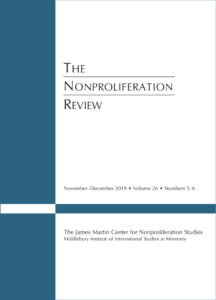Grand Prize winner: “The Smiling Buddha effect: Canadian and US policy after India’s 1974 nuclear test”
Runner-up prize split between “From CRISPR babies to super soldiers: challenges and security threats posed by CRISPR” and “Sitting on the boundary: the role of reports in investigations into alleged biological-weapons use”
The James Martin Center for Nonproliferation Studies and the Nonproliferation Review are pleased to announce the winners of the Doreen and Jim McElvany Nonproliferation Award for Vol. 27 (2020).
The Grand Prize winner

Joseph O’Mahoney
Department of Politics and International Relations, University of Reading
“The Smiling Buddha effect: Canadian and US policy after India’s 1974 nuclear test“
India’s “peaceful nuclear explosion” (PNE) in May 1974 cast a shadow over the still-new Treaty on the Non-Proliferation of Nuclear Weapons (NPT). Yet notable NPT holdouts Italy, Japan, and South Korea ratified the treaty within the next two years. Using primary-source research, Joseph O’Mahoney has found that India’s PNE galvanized pro-NPT forces in major nuclear supplier states. The United States and Canada responded to the PNE by threatening NPT holdouts with the withholding of further access to nuclear technology and materials unless they ratified the NPT. US Secretary of State Henry Kissinger also dropped his secret advice to Japan not to ratify the NPT in order to keep China unsure about Japan’s nuclear intentions.
The judges praised the originality of Dr. O’Mahoney’s research and its implications for both our understanding of the past and our future policy choices. One writes, “As this article demonstrates, new information can be revealed, new facts discovered, and conventional wisdom about why countries do what they do can and should be reconsidered.”
Nonproliferation Review editor Joshua H. Pollack commented on the judges’ choice, saying, “High-quality historical research continues to occupy a prominent place in these pages, whether it involves archival work, memoirs, or interviews. This is the second article to have received the McElvany Award in recent years that uses archival materials to deepen our understanding of nonproliferation history.”
Dr. O’Mahoney’s article is awarded the Grand Prize of $5,000.
The Runner-up Prizes
The Runner-up Prize is awarded jointly to two papers. Each involves a different aspect of dual-use biological technology or biological arms control.

Sonia Ben Ouaghram-Gormley
Schar School of Policy and Government, George Mason University
“From CRISPR babies to super soldiers: challenges and security threats posed by CRISPR“
The gene-editing technique CRISPR—clustered regularly interspaced short palindromic repeats—is often seen as a security threat. In theory, it could allow scientists or even amateurs to edit the genome of a variety of organisms, potentially causing harm to humans, plants, and animals. The recent use of CRISPR by Chinese scientist He Jiankui to edit the genome of viable human embryos, resulting in the birth of twin girls, has exacerbated those fears. This article reviews the timeline of Dr. He’s “CRISPR babies” experiment, identifies the challenges that contributed to the experiment’s failure, and evaluates the risks of CRISPR’s use for malevolent purposes. Although the potential for abuse is great, the technical obstacles are still too significant to allow successful modifications that would threaten security.
The judges praised Dr. Ben Ouaghram-Gormley’s research both for its thoroughness and for the sophistication of her analysis of the sociotechnical factors that made Dr. He’s experiments unsuccessful, building on prior research on synthetic biology and biological-weapons proliferation. One called it “an antidote” to worst-case thinking about the risks of misuse that the CRISPR gene-editing tool may pose.

Caitríona McLeish and Joshua R. Moon
Science Policy Research Unit, University of Sussex
“Sitting on the boundary: the role of reports in investigations into alleged biological-weapons use”
Concern about biological weapons has focused attention on the need to develop stronger capabilities for independent investigations of their alleged use. This article examines a crucial and under-appreciated aspect of the investigatory process: communicating its findings to policy makers. The authors detect an implicit shift toward understanding investigation reports not only as technical reports but also as policy documents, “sitting on the boundary between the science of the investigation that has taken place, and the deliberations in the policy context that will follow.” A clearer recognition of this role would aid the policy-making process that follows the delivery of the report. In particular, to establish a basis for policy audiences to evaluate its “veracity and trustworthiness,” the report must tell the story of how investigators reached their conclusions, and not only serve as a technical recounting of what investigators did and found.

The judges praised this work for its concrete suggestions about how to improve existing tools and practices. One noted that “whether policies work and norms hold” often depends on these “rubber-meets-the-road types of issues, often implemented at this seam between scientific and technological work and decision making.”
Each of these two articles is awarded $2,000 each: half of the award for the Runner-up Prize ($3,000) and half of the award for the Honorable Mention Prize ($1,000).
About the prize
The Doreen and Jim McElvany Nonproliferation Award recognizes exceptional scholarly research, innovative ideas, and policy proposals published in the Nonproliferation Review. All authors and co-authors of articles and viewpoints published in the Review are eligible for this prize, except current employees of the James Martin Center for Nonproliferation Studies.
Each year, a panel of three judges votes for a Grand Prize winner, a Runner-up Prize, and an Honorable Mention.
About the journal
The Nonproliferation Review is a refereed journal concerned with the causes, consequences, and control of the spread of nuclear, radiological, chemical, and biological weapons. The Review features theoretical analyses, historical studies, viewpoints, and book reviews on such issues as state-run weapons programs, treaties and export controls, safeguards, verification and compliance, disarmament, terrorism, and the economic and environmental effects of weapons proliferation.
The Nonproliferation Review is produced at the Washington, DC offices of the James Martin Center for Nonproliferation Studies, Middlebury Institute of International Studies at Monterey. The journal is published by Taylor & Francis.

